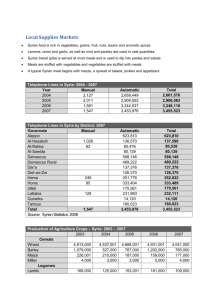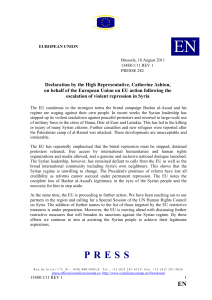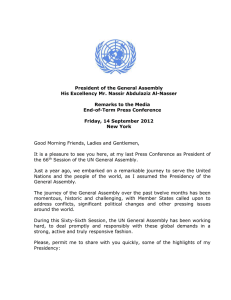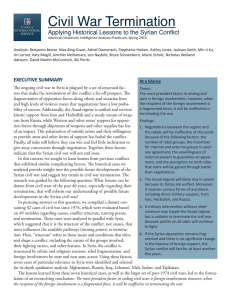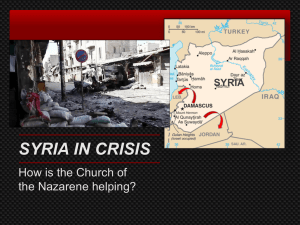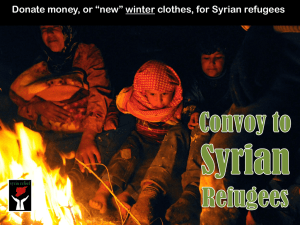The Syrian government has announced ... political reforms and constitutional amendments intended to facilitate Syria’s
advertisement
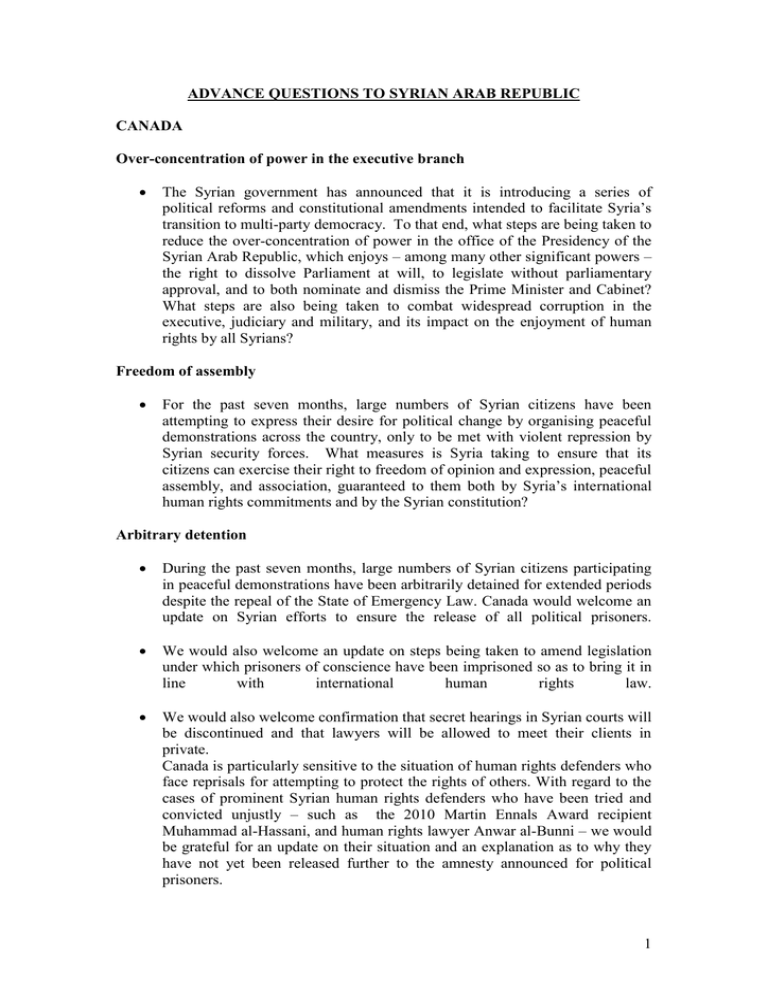
ADVANCE QUESTIONS TO SYRIAN ARAB REPUBLIC CANADA Over-concentration of power in the executive branch The Syrian government has announced that it is introducing a series of political reforms and constitutional amendments intended to facilitate Syria’s transition to multi-party democracy. To that end, what steps are being taken to reduce the over-concentration of power in the office of the Presidency of the Syrian Arab Republic, which enjoys – among many other significant powers – the right to dissolve Parliament at will, to legislate without parliamentary approval, and to both nominate and dismiss the Prime Minister and Cabinet? What steps are also being taken to combat widespread corruption in the executive, judiciary and military, and its impact on the enjoyment of human rights by all Syrians? Freedom of assembly For the past seven months, large numbers of Syrian citizens have been attempting to express their desire for political change by organising peaceful demonstrations across the country, only to be met with violent repression by Syrian security forces. What measures is Syria taking to ensure that its citizens can exercise their right to freedom of opinion and expression, peaceful assembly, and association, guaranteed to them both by Syria’s international human rights commitments and by the Syrian constitution? Arbitrary detention During the past seven months, large numbers of Syrian citizens participating in peaceful demonstrations have been arbitrarily detained for extended periods despite the repeal of the State of Emergency Law. Canada would welcome an update on Syrian efforts to ensure the release of all political prisoners. We would also welcome an update on steps being taken to amend legislation under which prisoners of conscience have been imprisoned so as to bring it in line with international human rights law. We would also welcome confirmation that secret hearings in Syrian courts will be discontinued and that lawyers will be allowed to meet their clients in private. Canada is particularly sensitive to the situation of human rights defenders who face reprisals for attempting to protect the rights of others. With regard to the cases of prominent Syrian human rights defenders who have been tried and convicted unjustly – such as the 2010 Martin Ennals Award recipient Muhammad al-Hassani, and human rights lawyer Anwar al-Bunni – we would be grateful for an update on their situation and an explanation as to why they have not yet been released further to the amnesty announced for political prisoners. 1 Allegations of torture The detention of large numbers of Syrian citizens for their participation in peaceful demonstrations over the past seven months has given rise to widespread torture and other forms of cruel and inhuman treatment of detainees by Syrian security forces, and a sharp rise in the number of reported deaths in custody. What measures is Syria taking to end the pervasive use of torture by the security forces, to investigate allegations of torture and to prosecute those responsible so that no such violations of Syria’s international human rights obligations go unpunished? Media access During the ongoing demonstrations for political change in Syria, the government has continued to restrict press freedom and has banned foreign journalists from the country. What efforts is Syria making to expand freedom of the press by allowing Syrian and international journalists the safe and unimpeded access they require to freely investigate and report on the situation in Syria? When will a new media law be enacted that will fully guarantee freedom of expression and access to the internet? What measures will be taken to protect journalists, bloggers, political activists, and human rights defenders in all fields and professions from intimidation; persecution; restrictions on their freedom of movement, including travel bans; and the blocking of their websites and blogs, thus permitting them to exercise their right to free expression, whether online, by participating in international fora or otherwise? Violence against women When will the draft national plan on the protection of women be implemented by the state and enacted into law? Will the Penal Code be amended to criminalise marital rape? Up to 300 women are victims of so called “honour killings” in Syria each year. Honour-related crimes against women should be severely punished. When will the Penal Code be amended to eliminate mitigating factors in sentencing for honour crimes so that penalties for these murders are not reduced? Discrimination against minorities, including the Kurdish minority What measures have been taken so far to amend legislation on nationality to address the stateless status of Syrian-born Kurds? What additional measures will be taken? How will Syria meet its legal obligations concerning the rights of minorities, guaranteeing equal rights to own property, access education, enter into civil marriage, participate in elections and access government employment, as well as allowing members of the Kurdish minority to legally leave and re-enter Syria? 2 Will Syria abolish all regulations concerning individuals prevented from travelling outside Syria without a legal warrant? DENMARK Has the Syrian government done anything to examine the circumstances of prisoners died in custody, including the cases of Ghiath Mattar, Hamza Ali alKhateeb, Obaida Sa’eed Akram, Tamer Mohamed al-Shar’i and Tariq Ziad Abd al-Qadr, and what are the findings? In light of the acceptance of an International Committee of Red Cross (ICRC) mission to monitor the situation in some Syrian prisons, can the Syrian government inform how many people have been arrested since March and where are these people currently located? What concrete steps have been taken since the emergency of state was lifted 21 April by presidential decree and what are the plans for the further implementation of this decree? 3
